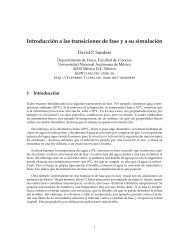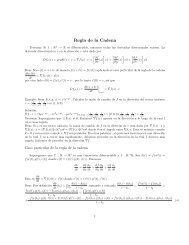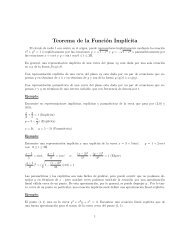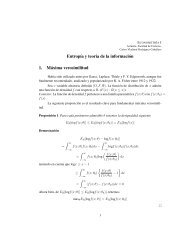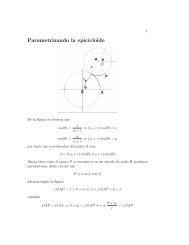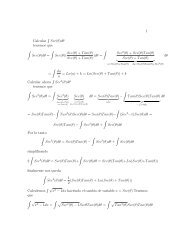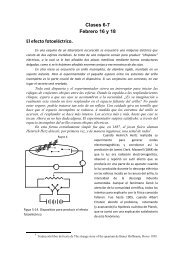"Surely You're Joking, Mr. Feynman!" - unam.
"Surely You're Joking, Mr. Feynman!" - unam.
"Surely You're Joking, Mr. Feynman!" - unam.
You also want an ePaper? Increase the reach of your titles
YUMPU automatically turns print PDFs into web optimized ePapers that Google loves.
ight, because of dis, and dis, and dis," and he turns to Einstein and says, "Don't you<br />
agree, Professor Einstein?"<br />
Einstein says, "Nooooooooooooo," a nice, Germansounding "No," very polite.<br />
"I find only that it would be very difficult to make a corresponding theory for<br />
gravitational interaction." He meant for the general theory of relativity, which was his<br />
baby. He continued: "Since we have at this time not a great deal of experimental<br />
evidence, I am not absolutely sure of the correct gravitational theory." Einstein<br />
appreciated that things might be different from what his theory stated; he was very<br />
tolerant of other ideas.<br />
I wish I had remembered what Pauli said, because I discovered years later that the<br />
theory was not satisfactory when it came to making the quantum theory. It's possible that<br />
that great man noticed the difficulty immediately and explained it to me in the question,<br />
but I was so relieved at not having to answer the questions that I didn't really listen to<br />
them carefully. I do remember walking up the steps of Palmer Library with Pauli, who<br />
said to me, "What is Wheeler going to say about the quantum theory when he gives his<br />
talk?"<br />
I said, "I don't know. He hasn't told me. He's working it out himself."<br />
"Oh?" he said. "The man works and doesn't tell his assistant what he's doing on<br />
the quantum theory?" He came closer to me and said in a low, secretive voice, "Wheeler<br />
will never give that seminar."<br />
And it's true. Wheeler didn't give the seminar. He thought it would be easy to<br />
work out the quantum part; he thought he had it, almost. But he didn't. And by the time<br />
the seminar came around, he realized he didn't know how to do it, and therefore didn't<br />
have anything to say.<br />
I never solved it, either a quantum theory of halfadvanced, halfretarded<br />
potentials and I worked on it for years.<br />
Mixing Paints<br />
The reason why I say I'm "uncultured" or "antiintellectual" probably goes all the<br />
way back to the time when I was in high school. I was always worried about being a<br />
sissy; I didn't want to be too delicate. To me, no real man ever paid any attention to<br />
poetry and such things. How poetry ever got written that never struck me! So I<br />
developed a negative attitude toward the guy who studies French literature, or studies too<br />
much music or poetry all those "fancy" things. I admired better the steelworker, the<br />
welder, or the machine shop man. I always thought the guy who worked in the machine<br />
shop and could make things, now he was a real guy! That was my attitude. To be a<br />
practical man was, to me, always somehow a positive virtue, and to be "cultured" or<br />
"intellectual" was not. The first was right, of course, but the second was crazy.<br />
I still had this feeling when I was doing my graduate study at Princeton, as you'll<br />
see. I used to eat often in a nice little restaurant called Papa's Place. One day, while I was<br />
eating there, a painter in his painting clothes came down from an upstairs room he'd been<br />
painting, and sat near me. Somehow we struck up a conversation and he started talking<br />
about how you've got to learn a lot to be in the painting business. "For example," he said,<br />
"in this restaurant, what colors would you use to paint the walls, if you had the job to



